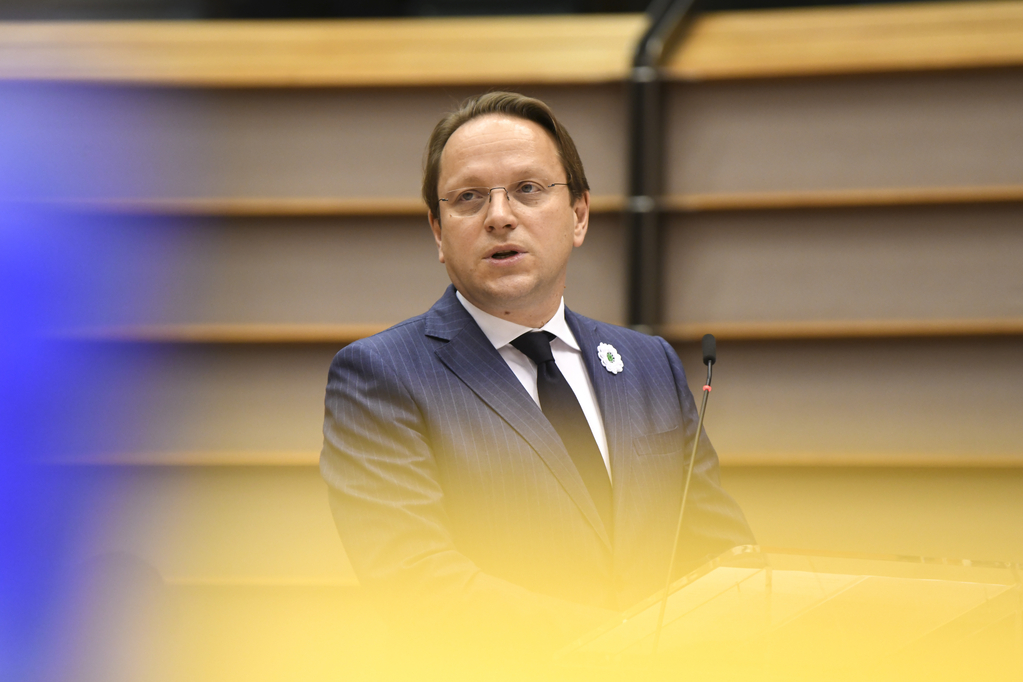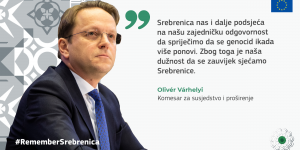Honourable Members,
Today we are remembering one of the darkest days of modern European history and one of the most tragic crimes committed in Europe since the Second World War. In July 1995, over 8,372 Muslim men and boys were deliberately and systematically killed by the Bosnian Serb forces in the UN “safe area” of Srebrenica, a town that they thought to be a safe in the war that was ravaging Bosnia and Herzegovina. Their bodies were thrown in mass graves, facing the ground, with their hands tied.
As the last victims of Srebrenica are buried in dignity, our hearts and thoughts are once again with them and with the survivors, their families and friends. We remember and honour the victims and we extend our sympathy to all those who are grieving. May they find healing for their enduring pain.
Europe has not forgotten what happened in Srebrenica and our own responsibility for not being able to prevent and stop the genocide. In Srebrenica, Europe failed and we are faced with our shame.
Indeed, the Srebrenica genocide remains an open wound at the heart of Europe. It continues to haunt us. It continues to remind us of our shared responsibility to prevent genocide from ever happening again. It is therefore our duty to remember Srebrenica forever.
It is also our duty to ensure accountability. Justice must be served, and all those responsible for the massacre must face the consequences of their actions. 25 years on, it is more urgent than ever to end impunity for the perpetrators of war crimes.
The massacre in Srebrenica was recognised as an act of genocide by two different international courts: the International Criminal Tribunal for ex-Yugoslavia in 2004 and the International Court of Justice in 2006. These established facts about what happened in Srebrenica, need to be acknowledged. Any attempts at denial and revisionism are unacceptable.
Political leaders have a great responsibility in that regard. They need to choose the truth, justice and cooperation over fear and hate to overcome the tragic legacies of the past and build a brighter and prosperous future for the next generations. The leaders of the region must take full ownership and lead by example.
There is no place in the EU for inflammatory rhetoric, let alone for glorification of war criminals from any side. Political leaders must be dedicated to bringing their citizens, especially young people, together around a common vision of the future, built on trust, mutual understanding and respect for one another.
Civil society’s contribution to such a future is fundamental. It plays a vital role in nurturing democratic culture of remembrance in the Western Balkans and throughout Europe, especially for the benefit of the young generation.
It is up to all of us in Europe to learn the lessons of Srebrenica. The values so brutally violated 25 years ago – the respect for human life and the respect for human dignity, freedom, democracy, equality – are now at the core of our engagement with Bosnia and Herzegovina and its citizens.
The European Commission continues to uphold these values in its relations with all of the Western Balkans countries. Implementing the rulings and decisions of international tribunals and promoting an environment conducive to reconciliation in order to overcome the legacies of the war are key elements for all countries in the region to progress towards EU accession.
This entails actively promoting reconciliation at all levels, to secure for long term the daily life of each citizen. It also entails providing redress to victims of wartime, rape and torture, supporting the return of refugees and displaced persons, and allowing the families of missing persons to achieve closure to their grief.
The European Union will continue to support Bosnia and Herzegovina to advance on its European path, establishing a society where pluralism, justice and human dignity prevail. Through the accession process, the EU will continue to accompany the Western Balkans towards reconciliation and regional cooperation, to build a peaceful and prosperous future for all the people of the region.
Acknowledging our past will help us to move forward. Indeed, without reconciliation there will be no long-term peace, stability and prosperity in the Western Balkans. That is why, I call on the Western Balkans to work in this direction, to heal the wounds of the past and deliver a common Europe!
Closing remarks
Thank you very much for taking the time to reflect together and remember the Srebrenica genocide. Now it is the time to honour the victims and express our empathy to the survivors, and support their families and friends whose lives have been affected.
The crime of genocide in Srebrenica must be a constant reminder that these acts must never be repeated! It should also remind us that genocide has happened not only in Srebrenica and there is no difference in genocide. Genocide is genocide.
Healing starts with remembering and continues with respecting the victims.
Thank you.




